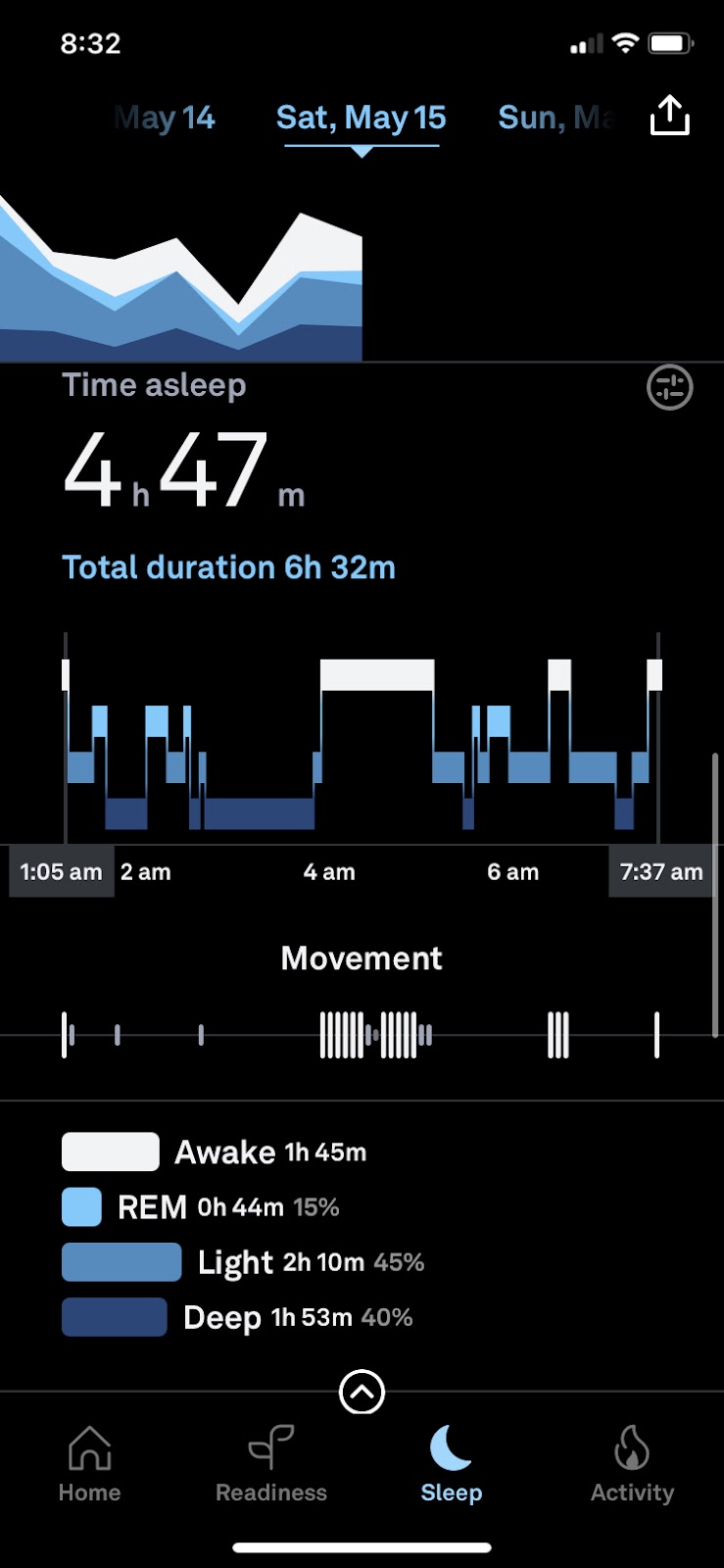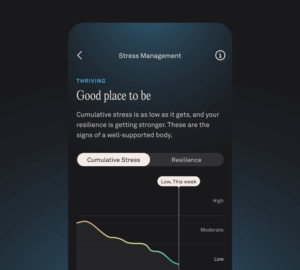“Pregnancy is a time of profound change to virtually all aspects of our lives, from our daily schedules, to our bodies, and our sleep!
Navigating all these changes while preparing for a newborn, particularly in the later stages of pregnancy, can be challenging, but prioritizing your sleep is among the most important things you can do as an expecting mother. Healthy sleep is vital for your physical, emotional, and cognitive health and well-being and, as research is starting to show, the quantity and quality of your sleep may be important for the safe arrival and health of your baby from the early weeks and into later stages of their development.
Fortunately, there are evidence-based strategies that can allow us to get the sleep our bodies need during this critical stage.”

—
Dr. Robbins is an Instructor in Medicine at Harvard Medical School and an Associate Scientist at the Brigham and Women’s Hospital where her research focuses on how to persuasively share information that can help individuals improve their sleep and circadian health.
Dr. Robbins is also a new mother. She gave birth to her son, Hap, in May and is sharing what she learned about changes in sleep throughout her own pregnancy journey in the hopes that it might resonate with others.
“My research is focused on adult sleep, which is fundamentally different from pediatric sleep. So, when I learned I was pregnant, I became an avid consumer of research on sleep during pregnancy and among newborns. Admittedly, I was nervous about the challenges ahead and potential barriers to my own sleep during pregnancy.”
What Patterns Did She Discover?
Schedules Needed Shifting
“It is common for women during the first trimester, in part due to hormonal changes, such as increasing levels of progesterone, and the tremendous changes going on in their body, to feel fatigued and need more sleep. In my first trimester, I slept much more than before pregnancy. I actually had to adjust my work schedule to be more flexible because I found that, despite sleeping at least 8 hours at night, that I was also very sleepy in the afternoon and often needed to nap in the middle of the day,” Dr. Robbins shared. “I would be out cold for two hours with my dog on the couch.”

“One of the silver linings of the COVID-19 pandemic for me was that it afforded the ability to work from home and maintain a flexible work schedule. Before the pandemic, I was traveling a great deal, working long hours, and spending a lot of time commuting to and from my office. Without the distractions and stressors of long commutes and travel, I was able to prioritize my health and get the sleep my body needed, which turned out to be very important for me during my pregnancy. It is exciting to think that our world may have woken up to flexible work hours and the need to prioritize employees’ health so that we collectively emerge from the pandemic a bit stronger, healthier, and more conscious of work/life balance.”
Sleep Could Be Improved
“In addition to needing more sleep, it is also common for women during pregnancy to experience insomnia. An analysis of more than 15,000 participants across over 20 studies found that approximately one in three women experience insomnia-like symptoms during pregnancy. [1]
These sleep difficulties peak during the third trimester. Despite these barriers to sleep, getting sufficient sleep during pregnancy is important as it is associated with improved mood, memory, immune function, and general health and well-being, which are all vital as you prepare for the arrival of your newborn.”
Dr. Robbins shares a few tips and strategies that can help you if you struggle with sleep difficulties during pregnancy:
- Create a sleep sanctuary. Ensure your bedroom can go down to about 68F. A cool sleep environment supports our healthy sleep, while a warm environment is associated with sleep fragmentation. You also want your bedroom to be soothing so that you feel relaxed when you walk in. Make sure your mattress and pillows are supportive, you have curtains to block outside light, and you have good air circulation and air quality. If your bedroom is stuffy, consider purchasing an air purifier.
- Sleep with a pregnancy pillow. As your belly starts to grow, it is important to sleep on your side. This can be challenging for women who prefer sleeping on their back or stomach. Many women find sleeping with a pregnancy pillow can help support their belly and keep them on their side.
- Focus on healthy sleep strategies. Find a time you can fall asleep and wake up most nights of the week. Make a commitment to following this sleep routine as best as you can. A consistent sleep routine will allow you to fall asleep faster than an inconsistent schedule. Relax and unwind close to bedtime by taking a warm shower, reading, or practicing relaxation strategies. Have a healthy, light dinner, and consume most of your calories earlier in the day because eating too close to bedtime can make it hard to fall asleep. Finally, make time for exercise. This will help with your mood and well-being during pregnancy and your recovery after you deliver.
The Fourth Trimester
“Your infant will be sleeping – a lot! – in the first few days and weeks. Infants sleep between 14 and 17 hours each day. However, it will not exactly be peaceful uninterrupted sleep….”
Dr. Robbins shares her own example of Hap waking her up at 4 AM and what to do if you’re in a similar situation.

“There are two fundamental challenges to a new mother and her infant’s sleep in the first few weeks and months of the baby’s life. First, in the womb, most babies are rocked to sleep as their mom walks, runs errands, and goes about their day. Then, the baby becomes awake at night when mom’s activity slows. Unfortunately, after birth, this results in an infant who is very ‘night active,’ sleeping during the day and waking up during the night. After birth, one of the key challenges is changing your newborn from being nocturnal to diurnal.
During this time, you have to give yourself patience and tell yourself that you’re temporarily in the trenches while your sleep is disrupted. Second, babies are less able to form a circadian rhythm, or a sleep schedule that is patterned like ours are as adults who fall asleep at a predictable time and wake up at a predictable time. Fortunately, there are a few evidence-based strategies for mother and infant sleep.”
Here are a few of Dr. Robbins’ tips:
- Get up and get outside: Light is the strongest cue to our circadian rhythm to become alert. Early morning light exposure, such as going out for a walk, can improve a mother’s alertness and help the baby eventually develop their circadian rhythm.
- Create soothing rituals for your infant: Infants are born with many reflexes, but the ability to calm themselves is not one such innate reflex. We want to cultivate their ability to relax and unwind before sleep by doing things that emulate the womb, such as swaddling them, making a shushing sound to emulate the sound in the womb (or sing a soothing lullaby), gently swaying or swinging them (see Dr. Harvey Karp’s full list of 5 S’s for Soothing Babies below!)
- Label your breast milk: If you are breastfeeding your infant and pumping your milk be mindful of the time you pump and feed your baby the expressed milk, for that expressed after sunset has been shown to have elevated levels of melatonin, which can help your infant adjust to a diurnal schedule.
- Nap when the baby naps: Although there is likely a mounting pile of tasks, ranging from laundry to emails, endeavor to nap during at least 1 or 2 of your baby’s daytime naps. A short “power nap” of 20 minutes in duration or less can help you survive in the early days where several nighttime awakenings are often unavoidable.
Learn More
If you’re interested in learning more about sleep during pregnancy, here are a few options from Dr. Robbins’ reading list:
- Tips for Sleep During Pregnancy
- Dr. Harvey Karp’s 5 S’s for Soothing Babies
- Sleep advice by child’s age from the Pediatric Sleep Council
References
[1] Sedov, I. D., Anderson, N. J., Dhillon, A. K., & Tomfohr‐Madsen, L. M. (2021). Insomnia symptoms during pregnancy: A meta‐analysis. Journal of Sleep Research, 30(1), e13207.










